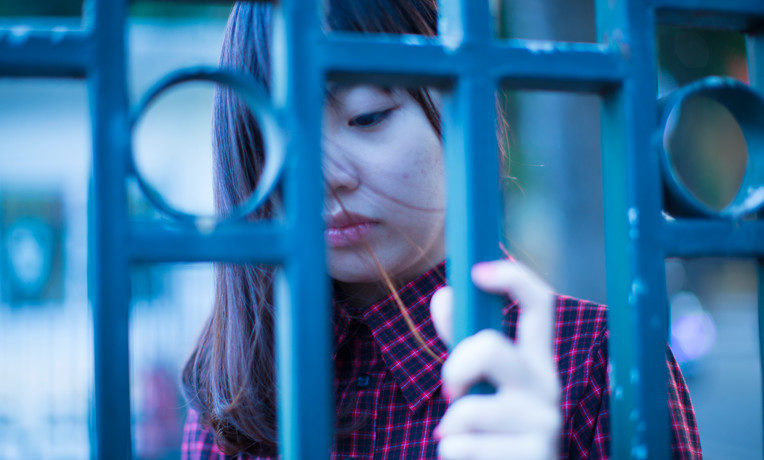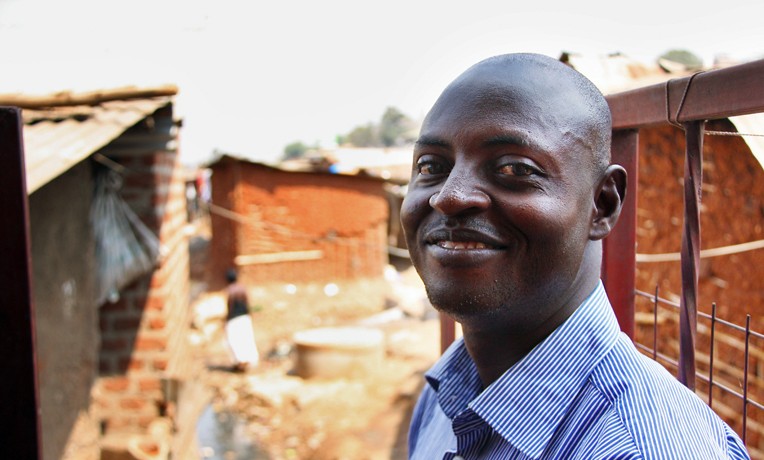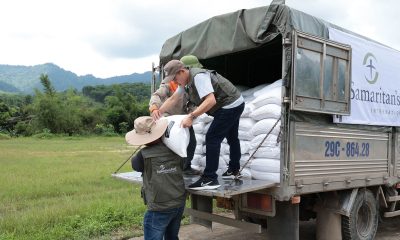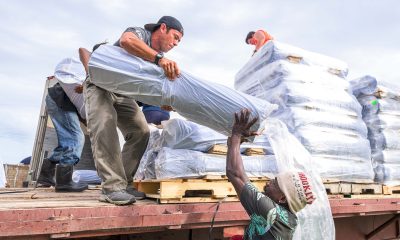A Samaritan's Purse ministry equips congregations in a notorious area to reach out in Christ’s love to broken and exploited women

Men and women come from all over East Africa to study and work in the bustling capital city of Kampala, Uganda. But people typically visit its largest slum, Katanga, for shadier reasons.
Katanga has become a red-light district synonymous with illicit activities, crime, and high abortion rates.
Most of the 20,000 men, women, and children who live in this jumble of red-tinted mud huts moved to the city in search of a better life. What they found instead was a lack of employment opportunities and a struggle to survive.
Pastor Job moved to Katanga from Nigeria nine years ago. Instead of coming with hopes to improve his own life, Job felt called to serve God’s people. A vibrant, well-educated man with a heart that beats to serve God, his passion and focus is empowering his church to love those most in need.

Katanga is a slum of Kampala associated with prostitution.
Job works with the My Sister’s Keeper project, a Samaritan’s Purse program aimed at helping churches reach out to vulnerable women and aid them in breaking free from bondage. Through trainings, workshops, and community screenings of documentaries like Nefarious (a film about human trafficking), congregations are becoming aware of the pervasive problem of sexual exploitation in their community and are being equipped to respond.
The Problem Is Big
The pervasiveness of sexual exploitation in Katanga became evident to Job soon after he moved to the slum.
“For a full year after moving to Katanga, I didn’t sleep at night,” he said. “I lived in the slum and slept in a hut made of bamboo and mud. Every night I would hear people talking … and [engaging in illicit activities]. It was terrible.”
Prostitutes in Katanga work day and night as men from Kampala slip in to pay for forbidden sex. When Job and the My Sister’s Keeper program first began looking for ways to help exploited women, they contacted a local prostitute ringleader.
“We told her to bring us women wanting to get out of the sex trade,” Job said. “The first week she brought 30 women. The next week she brought 42. We were shocked!

Many prostituted women in Katanga hope to leave their trade. Pastor Job’s church is showing them a community filled with love.
“The life of these women …”
Job paused, thinking about how to describe what “normal life” looks like for Katanga prostitutes.
“I have no other words to describe it but horrible.”
Paths Into the Sex Trade
Why? It’s the question that burns in the minds of those not familiar with the sex industry. If it’s so horrible, why do women become prostitutes? Why so many?
Pastor Job’s answer: lack of options, pressure, demand, and money.
For women struggling to make ends meet, sleeping in cramped rented rooms with dirt floors, prostitution is one of the most obvious ways to generate the income they need to survive. And the demand is high, especially for young prostitutes.
There are several common ways women in Katanga get pulled into the industry. Some are trafficked into the sex trade—moving to Kampala from small villages because they were promised work in the city at a good wage. They were unaware that the work they would be doing was prostitution.
Others were told by husbands or parents they had to sell their bodies in order to make money to keep their families alive. Others began because they saw no other options. It’s a lucrative business.
Becoming a Church for the Broken and Exploited
Job’s church has become a safe place for women working in prostitution to come for help.
They come with chipped nail polish and darting eyes.
They take drunken side steps.
They come needy.
They come as outcasts.
In addition to being extremely vulnerable to exploitation—often young, far from home, and without a means of providing for themselves—prostituted women are also considered outcasts. If a Ugandan woman is known to be involved in the sex trade, her family will disown her, churches will shun her, and people will avoid her out of fear that she might corrupt husbands and sons. It is a difficult stigma to overcome.
Job is teaching his congregation to love these women, see their needs, and care for them as Christ would instead of running from them.
“How can we dance in here and preach the Gospel in here while there are people dying outside our gates?” Job asked, his hand making a sweeping motion around his church’s sanctuary. “God has been breaking our hearts and changing our attitudes.”
His congregation sees the great need and responsibility of reaching out to sexually exploited women. Leaders in the church have been equipped with practical skills for working with them.
It can be a slow and painful process.
“Sometimes the women we work with are skeptical,” Job said. “They are used to being exploited.”
But the My Sister’s Keeper program is committed to encouraging churches and empowering them to love and help these women, and to help them see their identity and worth as daughters of God.
Once shunned, alone, and vulnerable, sexually exploited women are now being welcomed into Pastor Job’s church with open arms. They are finding hope to start their lives again.
“Some women have told us, ‘I have never seen anyone loving me the way you do,’” Job said. “The women want to know more about this love that comes from Jesus. They have found a sense of belonging here they haven’t found anywhere else.”
It’s a place of refuge and healing.
It’s a place where worth is not based on how young your body is or how much money you earn to send back to your family.
It’s a place of welcoming.
Job’s church is one of five in the slums around Kampala being trained and empowered through My Sister’s Keeper.
Helping exploited women find freedom and healing in Christ, while at the same time challenging the attitudes of Ugandan congregations, is “not a day’s work,” Job said. “It’s a hard commitment.”
Please pray for the pastors and churches engaged in My Sister’s Keeper, and that the women caught in the snare of prostitution will find freedom and forgiveness through faith in Christ.






